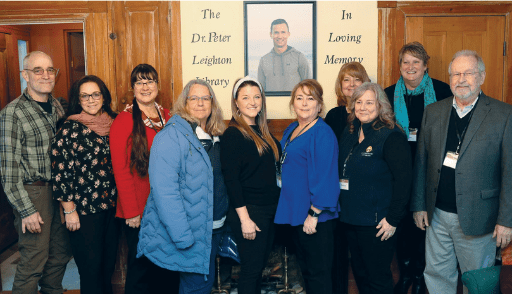A Tranquil Home to Find Sobriety
Kirsten Wears, Executive Director of Tucker’s House, has always had a passion for serving the underserved. She is an affected other and grew up in a household where Substance Use Disorder (SUD) was prevalent. “I worked at a local grocery store in Bridgton and found that in Bridgton alone there was tremendous need,” she said. “If I was ever in a position to create a job of my own, this would be it. I am very fortunate to be in this position and I am grateful to be here doing this.”
Opening Tucker’s House in Bridgton, ME was a three-year process for Kirsten Wears, Executive Director. Prior to opening in February 2023, Kirsten had to first establish nonprofit status, secure funding, and get a lease. Ultimately, she found “the perfect location, and the building was in turnkey condition.” Tucker’s House is now a MARR-certified Level III house, meaning there are some recovery services offered in addition to residence.
Laid off in March 2020 due to COVID, Kirsten began taking recovery coaching courses as well as training on how to supervise. She did a lot of reading and talking with her dad, who was sober. “He was a big part of this in the beginning,” she said. “He has been working in this field for 40 years since he got sober. “Having experience with loving someone who is struggling with substances helps remind you it is not who they are, it is the disease.”
The grounds at Tucker’s House are beautiful and meticulously maintained. “It is very peaceful and screams serenity,” Kirsten said. “Inside we function like a family unit. We are kind to each other and at the end of the day we just really try to focus on loving each other.” The women’s recovery house has ten beds and an 11th bed for a house manager.
“At the house, we dig into everything; budgeting and paying bills, preparing financially for life’s ‘what ifs,’ how to prepare a meal for people – all that we take for granted when we are not burdened with the disease,” said Kirsten. “They can learn how to adult here, when they fall, they have supporting, caring people around them. The meetings and chores serve as a “Welcome to Life 101.” Our youngest woman here was 19 and the oldest was 65.”
“We talk very clearly about transparency and have peer-to-peer accountability. Your own sobriety is your focus. Don’t let someone else affect that,” said Kirsten.
“One of the women wrote a note that reminded me why we do this work. It said ‘this house has given me a safe place to lay my head, and I am reminded every day that I am beautiful’,” Kirsten said. “Reminding them that they are strong tells them daily that they have value and worth. SUD has robbed them of so much time for what could be a beautiful life.”
“It is challenging when I can see within them something they don’t yet see in themselves. They don’t believe they are capable of doing great things and you want to shake it into them but you can’t. They have to see it for themselves,” said Kirsten.
“But when you see the self-pride begin to emerge, it’s definitely worth celebrating.”
This article was made possible with the support of the OPTIONS program and the Maine Office of Behavioral Health.



